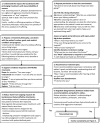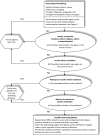Beyond the futility argument: the fair process approach and time-limited trials for managing dialysis conflict
- PMID: 23868900
- PMCID: PMC3817917
- DOI: 10.2215/CJN.12191212
Beyond the futility argument: the fair process approach and time-limited trials for managing dialysis conflict
Abstract
Futility is an ancient concept arising from Greek mythology that was resurrected for its medical application in the 1980s with the proliferation of many lifesaving technologies, including dialysis and renal transplantation. By that time, the domineering medical paternalism that characterized the pre-1960s physician-patient relationship morphed into assertive patient autonomy, and some patients began to claim the right to demand aggressive, high-technology interventions, despite physician disapproval. To counter this power struggle, the establishment of a precise definition of futility offered hope for a futility policy that would allow physicians to justify withholding or withdrawing treatment, despite patient and family objections. This article reviews the various attempts made to define medical futility and describes their limited applicability to dialysis. When futility concerns arise, physicians should recognize the opportunity to address conflict, using best practice communication skills. Physicians would also benefit from understanding the ethical principles of respect for patient autonomy, beneficence, nonmaleficence, justice, and professional integrity that underlie medical decision-making. Also reviewed is the use of a fair process approach or time-limited trial when conflict resolution cannot be achieved. These topics are addressed in the Renal Physician Association's clinical practice guideline Shared Decision-Making in the Appropriate Initiation and Withdrawal from Dialysis, with which nephrologists should be well versed. A case presentation of intractable calciphylaxis in a new dialysis patient illustrates the pitfalls of physicians not fully appreciating the ethics of medical decision-making and failing to use effective conflict management approaches in the clinical practice guideline.
Figures
Similar articles
-
Does professional autonomy protect medical futility judgments?Bioethics. 2006 Apr;20(2):92-104. doi: 10.1111/j.1467-8519.2006.00480.x. Bioethics. 2006. PMID: 16770879
-
[Futility in Cardiology].G Ital Cardiol (Rome). 2016 Jan;17(1):6-10. doi: 10.1714/2140.23180. G Ital Cardiol (Rome). 2016. PMID: 26901253 Italian.
-
The "futility debate" and the management of Gordian knots.J Clin Ethics. 1995 Summer;6(2):112-27. J Clin Ethics. 1995. PMID: 7496016 No abstract available.
-
Medical futility: response to critiques.Ann Intern Med. 1996 Oct 15;125(8):669-74. doi: 10.7326/0003-4819-125-8-199610150-00007. Ann Intern Med. 1996. PMID: 8849152 Review.
-
Medical futility: definition, determination, and disputes in critical care.Neurocrit Care. 2005;2(2):198-205. doi: 10.1385/NCC:2:2:198. Neurocrit Care. 2005. PMID: 16159066 Review.
Cited by
-
Ethical challenges in nephrology: a call for action.Nat Rev Nephrol. 2020 Oct;16(10):603-613. doi: 10.1038/s41581-020-0295-4. Epub 2020 Jun 25. Nat Rev Nephrol. 2020. PMID: 32587403 Review.
-
Healthcare professional education in shared decision making in the context of chronic kidney disease: a scoping review.BMC Nephrol. 2023 Jun 29;24(1):195. doi: 10.1186/s12882-023-03229-8. BMC Nephrol. 2023. PMID: 37386464 Free PMC article.
-
Futile Treatment-A Review.J Bioeth Inq. 2017 Sep;14(3):329-337. doi: 10.1007/s11673-017-9793-x. Epub 2017 Jun 20. J Bioeth Inq. 2017. PMID: 28634768 Review.
-
The Full Spectrum of Clinical Ethical Issues in Kidney Failure. Findings of a Systematic Qualitative Review.PLoS One. 2016 Mar 3;11(3):e0149357. doi: 10.1371/journal.pone.0149357. eCollection 2016. PLoS One. 2016. PMID: 26938863 Free PMC article.
-
Using time-limited trials to improve surgical care for frail older adults.Ann Surg. 2015 Apr;261(4):639-41. doi: 10.1097/SLA.0000000000000939. Ann Surg. 2015. PMID: 25211275 Free PMC article.
References
-
- Schneiderman LJ, Jecker NS, Jonsen AR: Medical futility: Its meaning and ethical implications. Ann Intern Med 112: 949–954, 1990 - PubMed
-
- Lo B: Futile Interventions. Resolving Ethical Dilemmas, A Guide for Clinicians, 4th Ed., Philadelphia, Lippincott Williams & Wilkins, 2009, pp 69–73
-
- Reiser SJ, Dyck AJ, Curran WJ, eds: Hippocratic corpus, the art. In: Ethics in Medicine: Historical Perspectives and Contemporary Concerns, Cambridge, MA, MIT Press, 1977, pp 6–7
-
- Plato: Republic, translated by Grube GM, Indianapolis, IN, Hackett Publishing, 1981, pp 76–77
Publication types
MeSH terms
LinkOut - more resources
Full Text Sources
Other Literature Sources
Medical



